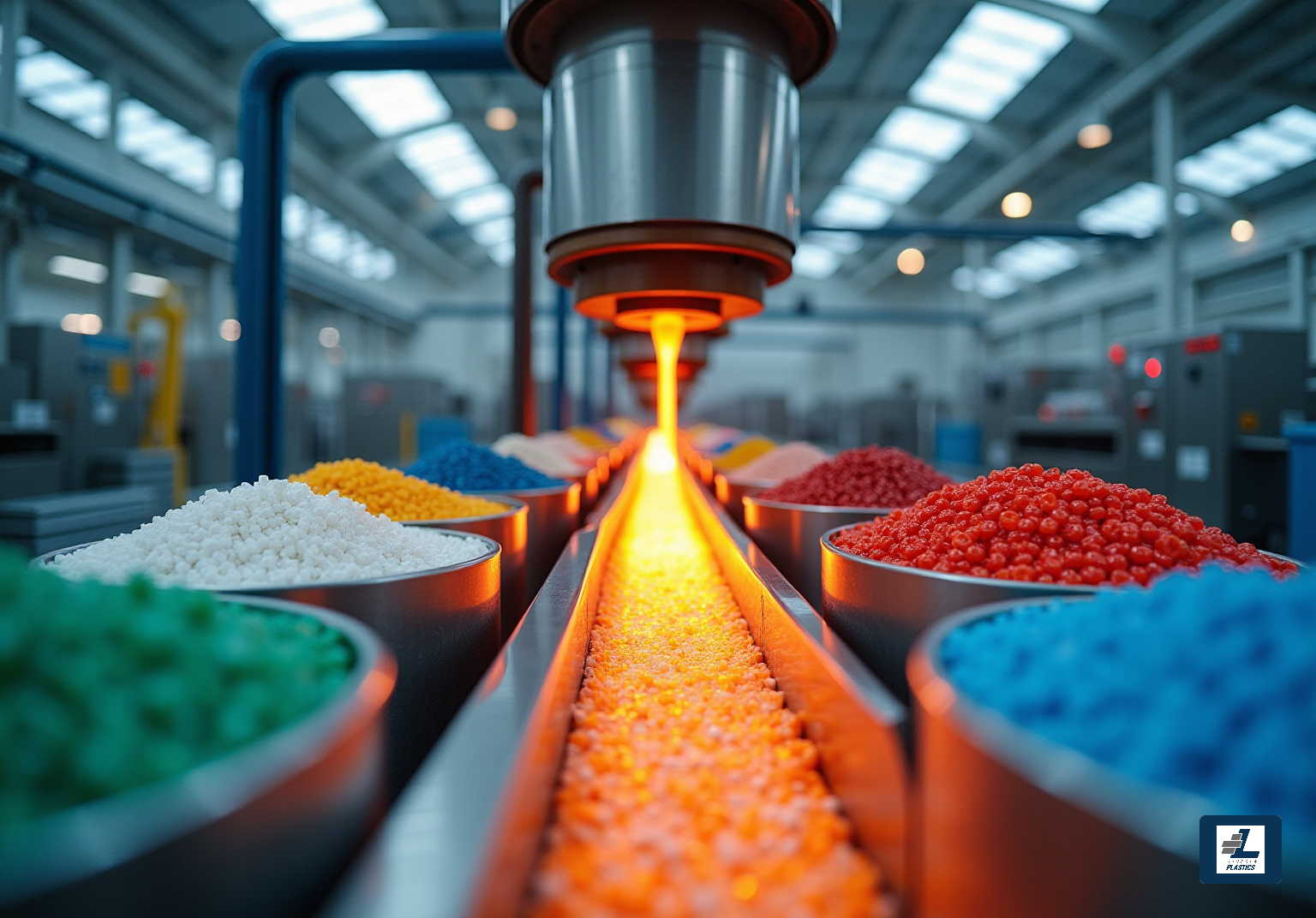
How to Choose the Right Extruded Plastics Manufacturers for Your Needs
Overview
Choosing the right extruded plastics manufacturers can feel a bit overwhelming, right? You want to make sure you’re picking someone who really gets your needs. So, what should you look for? Start by considering:
- Experience
- Customization capabilities
- Quality control standards
- Material options
- Production capacity
- Sustainability practices
- Technological advancements
By focusing on these key areas, you’ll be better equipped to find manufacturers like Lincoln Plastics. They not only meet your immediate project requirements but also help set you up for long-term success with their innovation and reliability. Sounds good, doesn’t it?
Introduction
Choosing the right extruded plastics manufacturer is crucial for your project's success, but let’s be honest—it can feel overwhelming with so many options out there. By getting a grip on the basics of plastic extrusion, like the materials involved and the manufacturing process, you can set yourself up for smarter decisions. But with competition ramping up and technology changing fast, how do you find a manufacturer who not only meets your current needs but also supports long-term collaboration and innovation? Let’s dive in and explore this together!
Understand the Basics of Plastic Extrusion Manufacturing
Plastic extrusion is a key manufacturing process that turns raw plastic into continuous profiles. You see this technique a lot in the production of pipes, tubes, and custom shapes. To really get a handle on this process, it’s important to know the different types of plastics used, like:
- Polyethylene
- Ridged PVC
- Flexible PVC
- Polypropylene
Each type of plastic has its own unique traits—think material strength, flexibility, and temperature resistance—that can greatly influence how the final product performs.
So, how does the extrusion process work? Well, it starts with feeding plastic pellets into an extruder, where they get heated and pushed through a die to form the desired shape. This method opens the door to creating a wide range of items, from pipes and sheets to specialized profiles designed for specific uses.
Now, let’s talk about material selection. Choosing the right plastic is crucial; different types come with distinct properties that need to match the product's intended use. For example:
- High-density polyethylene (HDPE) is a go-to in construction because it’s durable.
- Low-density polyethylene (LDPE) is popular in packaging thanks to its flexibility.
Understanding these material properties is key when you’re collaborating with to nail down precise requirements.
Successful plastic extrusion projects often showcase the power of customization. Take, for instance, a plastics company that specializes in crafting custom extruded profiles to meet OEM specifications. They offer innovative solutions like custom flexible cord covers and the Flexiduct system, which enhance workplace safety and productivity. This level of customization not only boosts performance but also helps build lasting partnerships based on reliability and trust. Plus, Lincoln Plastics is there to help clients with design optimization and material selection, ensuring products are tailored to their exact needs.
As the market for extruded plastics manufacturers keeps expanding—thanks to growing demand across various sectors—staying updated on the latest advancements and material options is essential. This knowledge empowers purchasing managers to make strategic decisions that align with their operational goals. So, are you ready to dive into the world of plastic extrusion and explore how it can benefit your projects?
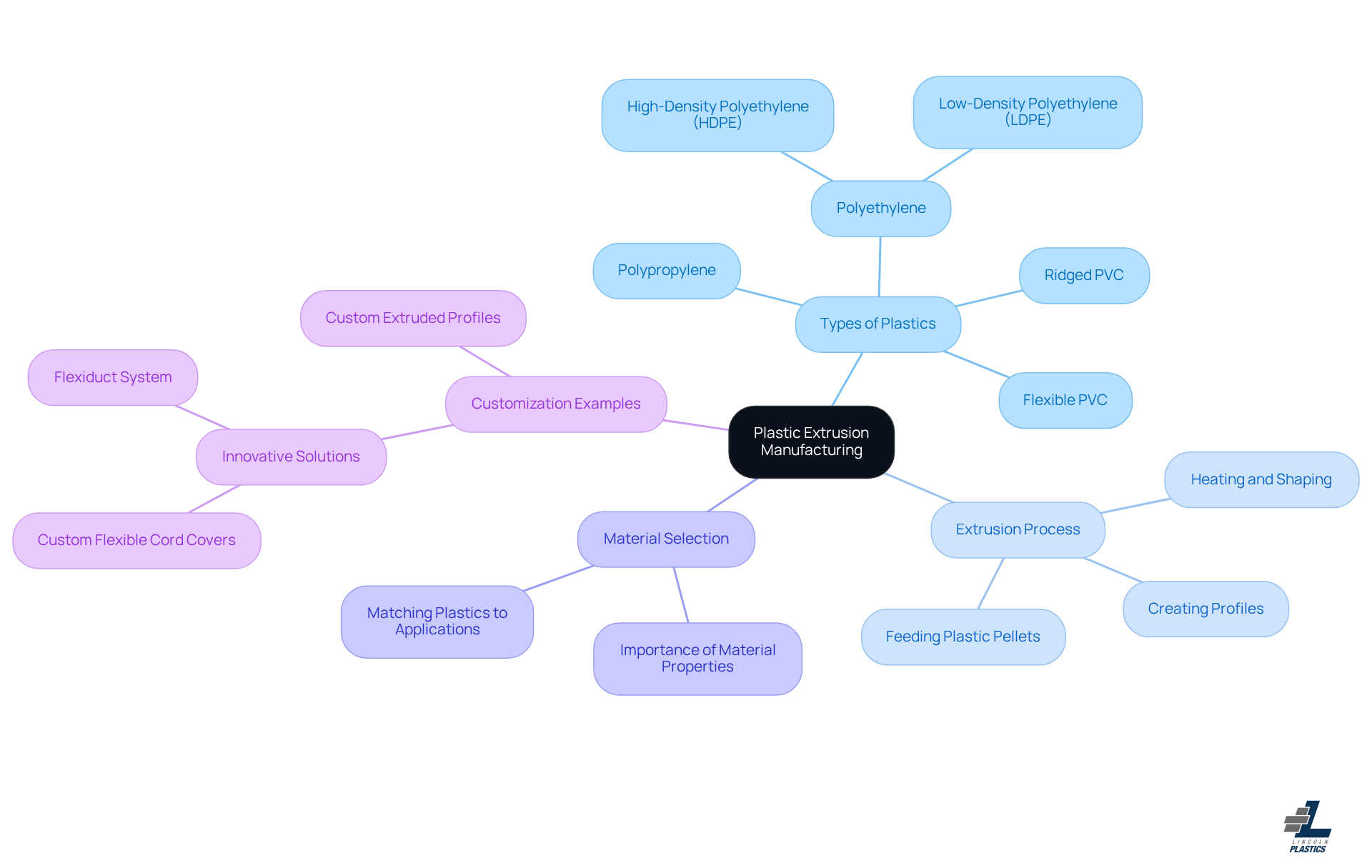
Identify Key Criteria for Selecting Manufacturers
When you're on the hunt for extruded plastics manufacturers, there are a few key things to keep in mind that can really help you make the right choice.
First up, let’s talk about Experience and Expertise. It’s always a good idea to choose extruded plastics manufacturers who have a solid track record in the industry. Take Lincoln Plastics, for example. Located in Lincoln, NE, they specialize in custom profile extrusions using materials like polyethylene, ridged PVC, flexible PVC, and polypropylene. Their extensive experience as extruded plastics manufacturers can significantly impact the quality and efficiency of production, enabling them to tackle challenges and deliver reliable results.
Next, you’ll want to consider Customization Capabilities. It’s super important to find a producer that can handle your custom designs and specifications. Lincoln Plastics shines here, as they excel at tailoring their offerings to meet your unique project needs. This is often crucial for achieving the functionality and aesthetics you’re after.
Now, let’s talk about Quality Control. You’ll want to ensure that the extruded plastics manufacturers adhere to established standards of excellence, such as . Lincoln Plastics, as one of the leading extruded plastics manufacturers, is ISO 9001 accredited, which shows their commitment to high manufacturing standards and consistent performance. They work closely with OEMs to make sure their products meet all quality standards, including special checks for fit and function.
Another thing to think about is Material Options. The variety of materials that extruded plastics manufacturers can utilize can greatly impact the performance and longevity of your final product. Lincoln Plastics can process any plastic resin to meet your needs, offering a diverse material portfolio that enhances adaptability for specific applications.
Don’t forget to assess the Production Capacity as well. Can the producer handle your order volume and meet deadlines? A company like extruded plastics manufacturers, which have strong production capabilities, can ensure timely delivery, which is essential for keeping your project on track.
Sustainability is also a big deal these days, so consider the practices of potential extruded plastics manufacturers. Lincoln Plastics is committed to eco-friendly practices, aligning with the growing demand for sustainability in the industry.
Lastly, keep an eye out for Technological Advancements. Look for extruded plastics manufacturers who utilize contemporary technologies, such as automation and Industry 4.0 principles, to enhance production efficiency and customization capabilities. These advancements can really elevate the standard and speed of production.
By focusing on these criteria, you can identify producers like Lincoln Plastics who not only meet your immediate needs but also contribute to the long-term success of your projects through excellence and innovation.
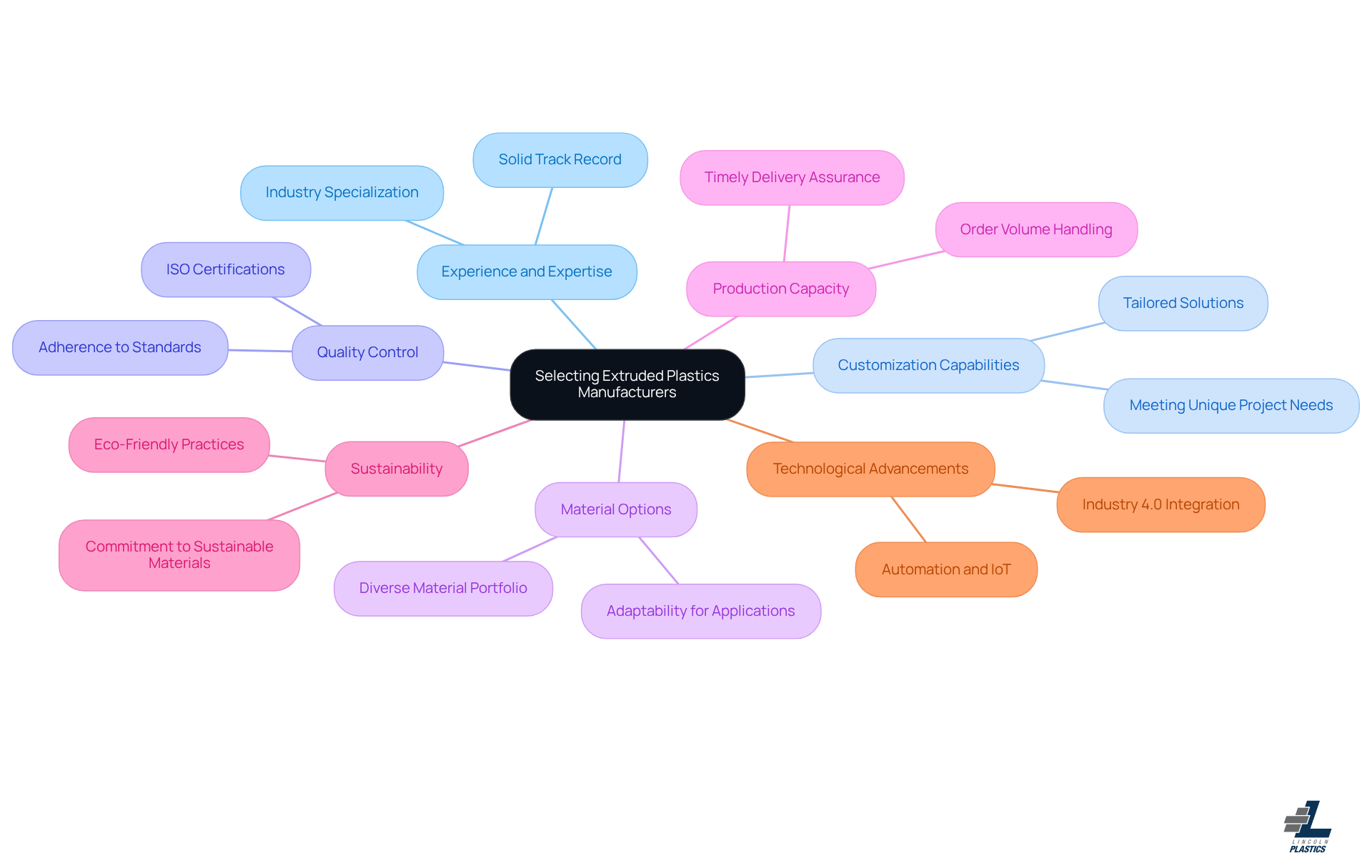
Evaluate Manufacturer Capabilities and Certifications
When you're looking to evaluate a manufacturer’s capabilities, there are a few key things to keep in mind:
- Review Certifications. It’s important to check for certifications like ISO 9001. This shows that the manufacturer meets management standards. If they’re accredited to this standard, you can feel confident that they maintain consistent quality and follow both national and global regulations.
- Assess Equipment and Technology. Take a look at the machinery and technology that extruded plastics manufacturers use in the extrusion process. For extruded plastics manufacturers, advanced equipment like multi-layer co-extruders and precision cutting systems is crucial for achieving high precision and efficiency in production.
- Check Production Processes. Understand how the manufacturer approaches . At our company, we work closely with OEMs to ensure that all products meet quality standards. We use various check gauges to make sure everything fits just right, and we uphold a strong quality system with essential in-process checks.
- Request Case Studies or References. Ask for examples of previous projects that are similar to yours. For instance, Lincoln Plastics has a solid track record of successful collaborations with OEMs, providing tailored solutions that meet specific needs. This can really boost your confidence in their ability to deliver what you require.
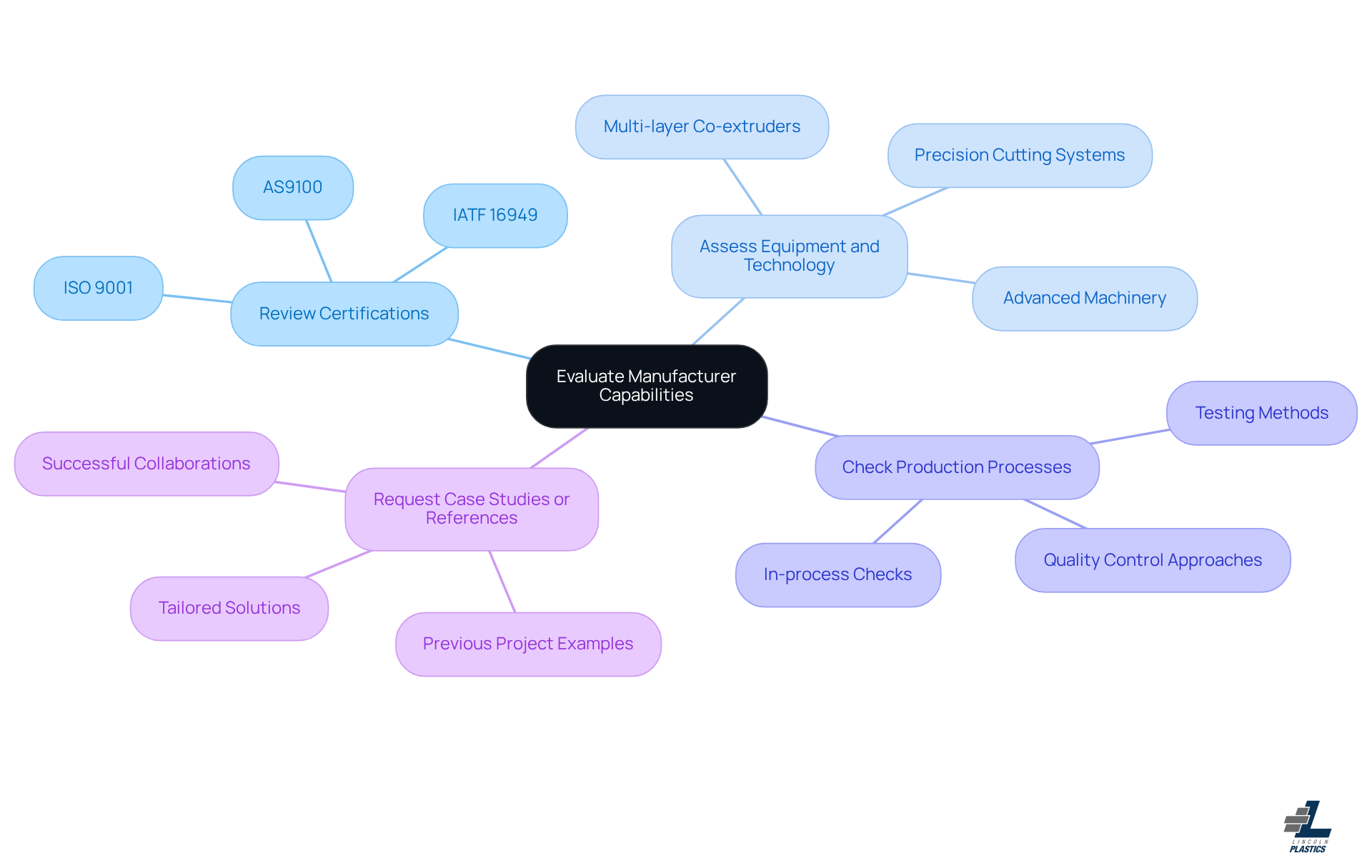
Engage with Manufacturers: Questions and Information to Gather
When you're reaching out to potential manufacturers, it’s a good idea to ask a few key questions:
- What’s your production lead time? Knowing how long production will take is super important for planning your project effectively. If lead times aren’t managed well, delays can throw off your schedule and hurt productivity.
- Can you provide samples of previous work? By asking for samples, you can directly check the quality of their products to make sure they meet your standards. This step is crucial in selecting a manufacturer that aligns with what you’re looking for.
- What materials do you specialize in? Understanding their material expertise helps you figure out if they can meet your specific needs. Different materials have unique benefits, like durability and chemical resistance, which can be vital for various applications.
- How do you manage control standards? It’s worth asking about their quality assurance processes to ensure they maintain high standards during production. A solid quality control system shows that a manufacturer is committed to delivering reliable products.
- What are your payment terms and conditions? Getting clarity on financial matters upfront can help avoid misunderstandings later on. Transparent payment terms make for a smoother collaboration.
By asking these questions, you’ll gain valuable insights into a manufacturer’s capabilities and ensure they’re a good fit for your project.
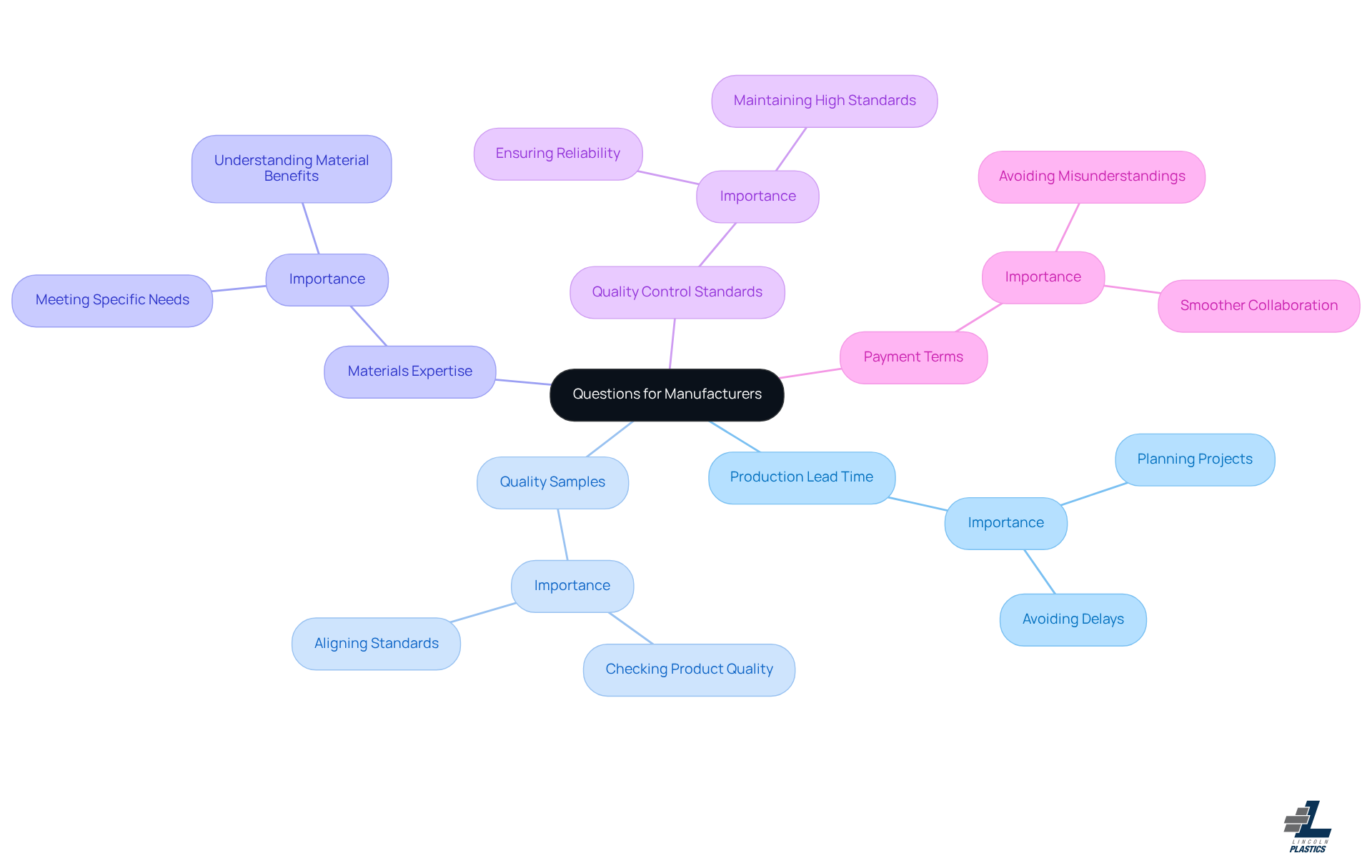
Compare Quotes and Negotiate Terms Effectively
So, you’ve gathered quotes from extruded plastics manufacturers—what are your next steps? Let’s dive into some essential steps to help you compare and negotiate effectively.
- First off, break down each quote. Itemize the costs, detailing materials, labor, and any extra fees. This breakdown not only clarifies the pricing structure but also highlights areas where you might negotiate.
- Next, evaluate value, not just price. It’s tempting to focus solely on the lowest number, but consider the overall value each producer brings to the table. Think about product quality, customer service, and delivery timelines. These factors can significantly impact your long-term satisfaction and performance.
- Now, let’s talk about utilizing historical pricing data. This can be a game-changer! Use it to set realistic target prices during negotiations. Having this factual basis will strengthen your position and bring clarity to your discussions.
- Don’t forget to negotiate terms! Engage in discussions about payment schedules, delivery timelines, and minimum order quantities. Many extruded plastics manufacturers are willing to modify these terms to win your business, which can lead to more favorable conditions for you.
- Establishing key performance indicators (KPIs) is another crucial step. Define these to measure vendor performance effectively. This way, you ensure you’re getting value from your agreements and can guide future negotiations.
- You might be wondering how to . Well, use the rivalry among producers to create urgency and potentially better offers. This strategy can really boost your negotiating power.
- And here’s a tip: establish a relationship. Cultivating a strong rapport with your chosen manufacturer can lead to better communication and future benefits, like priority service or discounts on larger orders. A positive relationship can enhance collaboration and even spark innovative solutions tailored to your needs.
- Finally, get those agreements in writing! Make sure all negotiated terms are documented to avoid any misunderstandings. This is key for maintaining clarity and accountability in your agreements.
By implementing these strategies, you’ll navigate the complexities of supplier negotiations like a pro, ensuring you secure the best possible outcomes for your manufacturing contracts. Ready to get started?
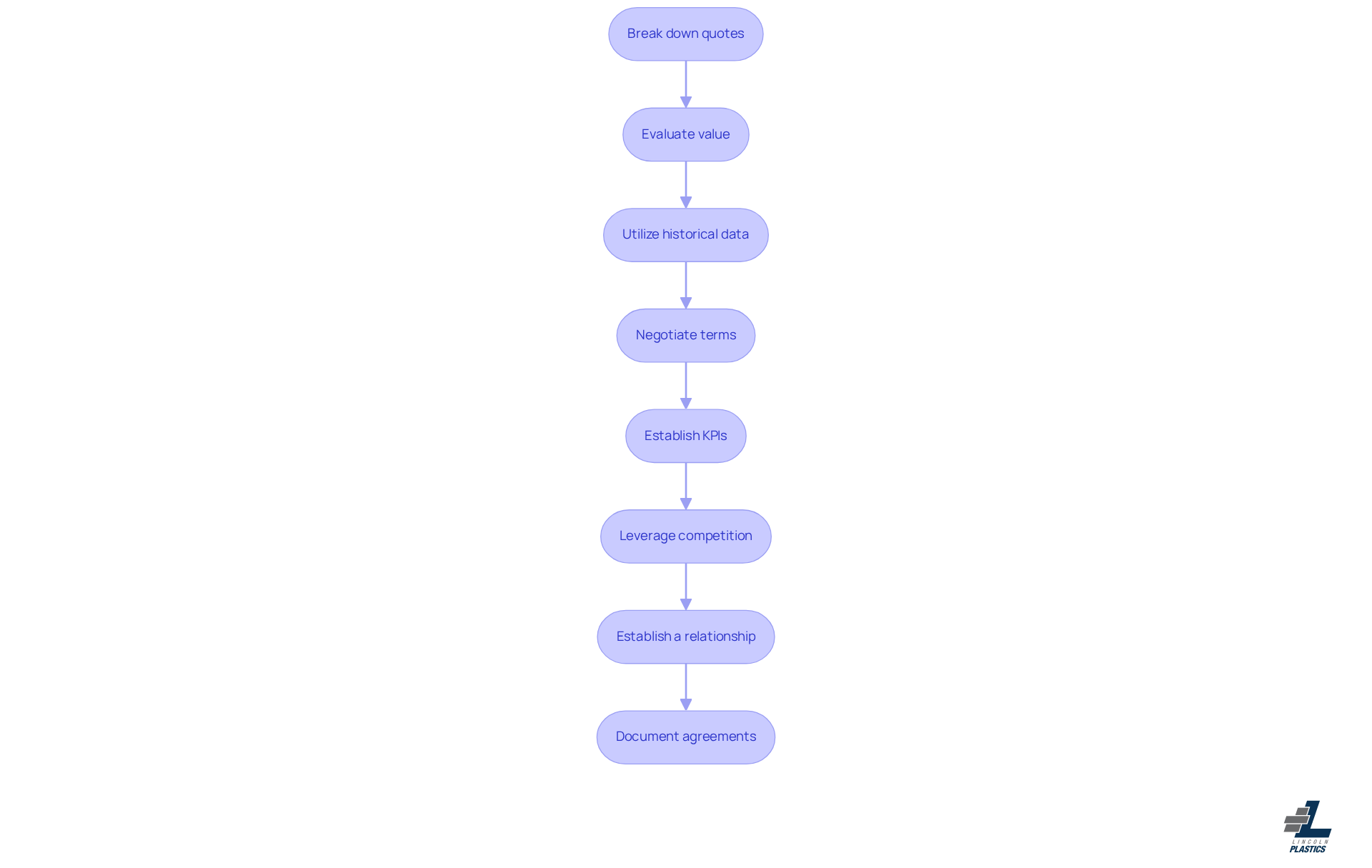
Conclusion
Choosing the right extruded plastics manufacturer? That’s a big deal! It can really shape the success of your project. By diving into the details of plastic extrusion—like the materials out there and what different manufacturers can do—you'll be better equipped to make choices that fit your goals.
So, what should you look for? Think about:
- A manufacturer’s experience
- Their ability to customize
- Their quality control processes
- How committed they are to sustainability
Engaging with potential manufacturers through some targeted questions and checking out their certifications and tech advancements can really help in the selection process. And don’t forget to compare quotes and negotiate! This way, you can snag terms that not only meet your needs but also pave the way for long-lasting partnerships.
Now, in this fast-paced industry, staying updated on the latest trends and technologies in plastic extrusion is key. This knowledge gives you the power to pick manufacturers who not only deliver quality products but also stay ahead of the game and adapt to what the market demands. Embracing these best practices will help ensure your projects run smoothly, sustainably, and with a focus on excellence. Ready to take the next step?
Frequently Asked Questions
What is plastic extrusion manufacturing?
Plastic extrusion manufacturing is a process that transforms raw plastic into continuous profiles, commonly used for producing pipes, tubes, and custom shapes.
What types of plastics are commonly used in the extrusion process?
Common types of plastics used in extrusion include polyethylene, ridged PVC, flexible PVC, and polypropylene.
How does the plastic extrusion process work?
The extrusion process begins by feeding plastic pellets into an extruder, where they are heated and pushed through a die to form the desired shape.
Why is material selection important in plastic extrusion?
Material selection is crucial because different plastics have distinct properties that must match the product's intended use, affecting performance and durability.
What are some examples of plastics and their applications?
High-density polyethylene (HDPE) is often used in construction for its durability, while low-density polyethylene (LDPE) is favored in packaging due to its flexibility.
How does customization play a role in plastic extrusion projects?
Customization allows manufacturers to create tailored extruded profiles that meet specific OEM specifications, enhancing performance and building reliable partnerships.
What should I consider when selecting extruded plastics manufacturers?
Key criteria include experience and expertise, customization capabilities, quality control, material options, production capacity, sustainability practices, and technological advancements.
Why is quality control important in plastic extrusion manufacturing?
Quality control ensures that manufacturers adhere to established standards, such as ISO certifications, which guarantee high manufacturing standards and consistent product performance.
How does production capacity affect my choice of manufacturers?
A manufacturer's production capacity is important to ensure they can handle your order volume and meet deadlines, which is essential for keeping your project on track.
What role does sustainability play in selecting a manufacturer?
Sustainability is increasingly important in the industry, so consider manufacturers that commit to eco-friendly practices to align with growing environmental demands.
How can technological advancements impact plastic extrusion?
Utilizing contemporary technologies, such as automation and Industry 4.0 principles, can enhance production efficiency and customization capabilities, improving overall production standards.
List of Sources
- Understand the Basics of Plastic Extrusion Manufacturing
- 10 Key Insights on Profile Extrusion Plastic for OEM Managers (https://lincoln-plastics.com/news-post/10-key-insights-on-profile-extrusion-plastic-for-oem-managers)
- Extruded Plastics Market Size, Share & Growth Report, 2030 (https://grandviewresearch.com/industry-analysis/extruded-plastics-market-report)
- Plastics Extrusion | Plastics Technology (https://ptonline.com/topics/extrusion)
- Extrusion: Pipe & Profile recent news | Plastics Today (https://plasticstoday.com/plastics-processing/extrusion-pipe-profile)
- Identify Key Criteria for Selecting Manufacturers
- The Extrusion Industry in 2025: Innovations, Trends, and Opportunities (https://plextrusions.com/extrusion-blog/the-extrusion-industry-in-2025-innovations-trends-and-opportunities)
- Extruder builders hope rebound in orders continues through 2025 (https://plasticsnews.com/news/extruder-builders-hope-rebound-orders-continues-through-2025)
- Plastic Sheet Extrusion Machinery Market: Key Stats & Trends, And Impact of AI (https://linkedin.com/pulse/plastic-sheet-extrusion-machinery-market-key-stats-trends-7zwbe)
- Plastic Extruder Manufacturers: Insights into the Plastic Extrusion Process and Leading Companies (https://pom-material.com/blog/plastic-extruder-manufacturers)
- Plastic Extrusion Equipment Market Size, Forecast - 2035 (https://marketresearchfuture.com/reports/plastic-extrusion-equipment-market-40180)
- Evaluate Manufacturer Capabilities and Certifications
- ISO 9001 in manufacturing: learn how to transform your process (https://ideagen.com/thought-leadership/blog/iso-9001-manufacturing)
- Why ISO 9001 Certification Matters for You — Our Commitment to Quality Manufacturing | Bullen Ultrasonics (https://bullentech.com/why-iso-9001-certification-matters-for-you-our-commitment-to-quality-manufacturing)
- Quality Management in Manufacturing Operations with ISO 9001 (https://americanglobal.org/news/quality-management-in-manufacturing-operations-with-iso-9001)
- Why ISO 9001:2015 Certification Matters | Touch Dynamic (https://touchdynamic.com/blogs/news/why-you-should-choose-a-manufacturer-with-iso-90012015-certification)
- The Importance of ISO Certification in Manufacturing (https://zengrc.com/blog/the-importance-of-iso-certification-in-manufacturing)
- Engage with Manufacturers: Questions and Information to Gather
- Understanding the Crucial Role of Lead Time in Supply Chain Management - Lillyworks (https://lillyworks.com/blog/understanding-the-crucial-role-of-lead-time-in-supply-chain-management)
- The Importance of Lead Times in Manufacturing: How Hammond Machine Works Keeps You On Schedule - Hammond Machine Works (https://hammondmachine.com/the-importance-of-lead-times-in-manufacturing)
- Extruded Plastics Market Size to Hit USD 260.43 Bn by 2034 (https://precedenceresearch.com/extruded-plastics-market)
- What is Plastic Extrusion and How to Select the Best Manufacturing Partner? (https://paulmurphyplastics.com/industry-news-blog/what-is-plastic-extrusion-and-how-to-select-the-best-manufacturing-partner)
- Plastic Pipe Extrusion Production Line Market Report | Global Forecast From 2025 To 2033 (https://dataintelo.com/report/global-plastic-pipe-extrusion-production-line-market)
- Compare Quotes and Negotiate Terms Effectively
- Plastic Injection Moulders - Comparing Quotes Effectively (https://toolcraft.co.uk/plastic-injection-moulding/advice/advice-plastic-injection-moulders-quote-comparing.htm)
- Negotiation Quotes — 25 Legendary Quotes Full of Wisdom (https://procurementtactics.com/negotiation-quotes)
- Mastering the Art of Supplier Negotiation in Manufacturing Procurement - CADDi (https://us.caddi.com/resources/insights/negotiation-procurement)
- Negotiations in the News: Lessons for Business Negotiators (https://pon.harvard.edu/daily/business-negotiations/current-negotiations-in-the-news-lessons-for-business-negotiators)
- 9 Strategies to Use When Negotiating Contracts With Vendors (https://brex.com/spend-trends/vendor-management/strategies-for-negotiating-contracts-with-vendors)


